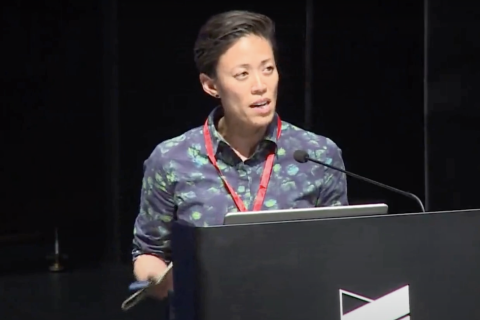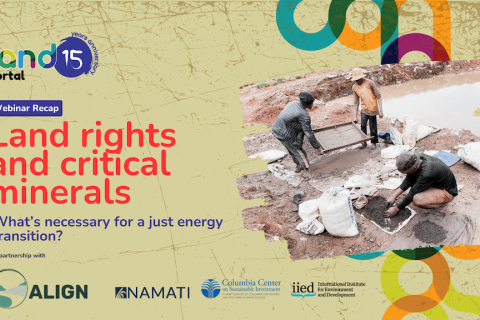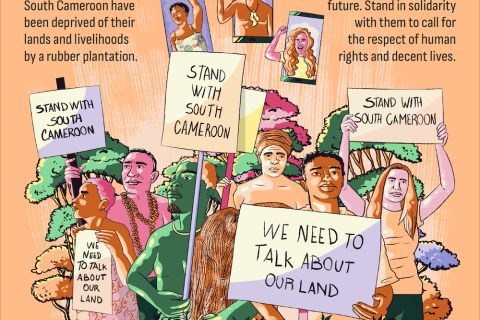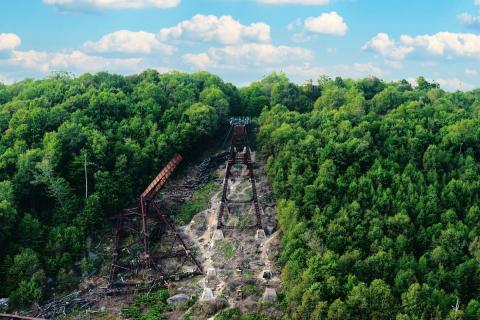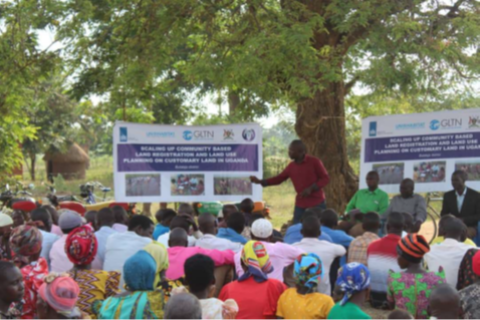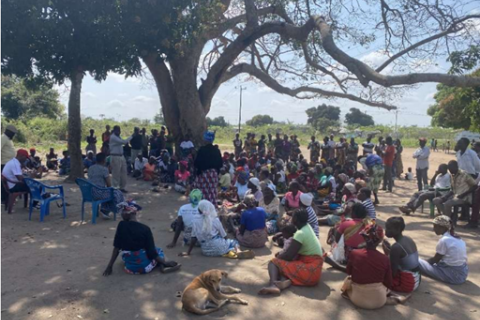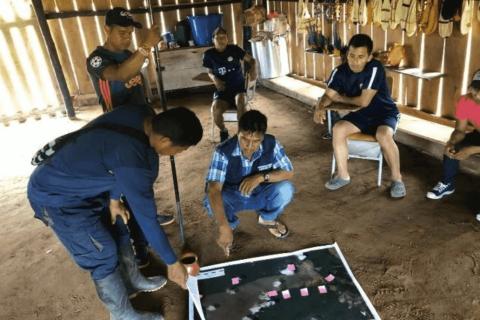Webinar recap: land rights and critical minerals
Protecting Biodiversity Hinges on Securing Indigenous and Community Land Rights
In 2022, countries reached a historic agreement to halt biodiversity loss by conserving at least 30% of land and water by 2030. This marked a critical step toward protecting the world's precious remaining species and ecosystems. But that's not all: The Global Biodiversity Framework, as it's known, also explicitly calls on countries to recognize and uphold Indigenous Peoples and local communities' rights in their conservation strategies.
SudCam: A Decade of Broken Promises and Community Struggles
In the villages surrounding SudCam's vast rubber plantation in Southern Cameroon, the contrast between initial promises and current reality is striking. More than a decade after the establishment of this Halcyon Agri Corporation Limited subsidiary, local communities face a radical transformation of their environment and way of life.
Beyond Transparency: Meaningful and Inclusive Public Participation to Counter Land Corruption in Carbon Markets
In Cambodia, a recent Human Rights Watch report documents how Indigenous Chong people have faced eviction and criminal charges following the establishment of a carbon offsetting project on their lands. In Kenya, “the world’s largest soil carbon removal project”, whose credits have been used to offset the emissions of global corporations including Meta and Netflix, has been accused of dispossessing Indigenous Peoples of economically and culturally significant land, and reducing the climate resilience of thousands of people.
Addressing Urban Governance and Environmental Challenges in Buea: A Policy Brief for the Local Community
Buea, a picturesque city in the foothills of Mount Cameroon, is experiencing rapid urban development in the region. However, the town faces a number of urban governance and environmental challenges such as poor waste management, deforestation and poor air quality amongst others that demand urgent attention. Recognizing the critical importance of addressing these challenges, this policy brief aims to highlight the complexities of urban governance and environmental management in Buea.
In the business of ‘doing’ – how gender is operationalized in land governance working with displaced communities in Somalia
The Saameynta Joint Programme is a project aimed at achieving durable solutions for internally displaced people in Somalia, which currently hosts 3.8 million IDPs. Land governance is at the center of this effort, understanding that tenure security is a fundamental piece of the puzzle to enable durable solutions.
Understanding the link between Climate & LAND-at-scale country projects - Community-Based Approach on Wetland Management Planning in Butaleja District Uganda
As part of a scoping study titled Land Governance for Climate Resilience: A review and case studies from LAND-at-scale projects headed by Richard Sliuzas, Emeritus Professor, University of Twente, GLTN dove into the links between climate and land governance in the ‘’Scaling up community-based land registration and land use planning on customary land in Uganda’’ project. This case study highlights experiences from the community-based wetland management planning approach in Butaleja, Uganda, focusing on how the approach is addressing land governance issues and contributing to community climate resilience.
Understanding the link between Climate & LAND-at-scale country projects - The nexus between land governance and climate change, Búzi District, Sofala Province, Mozambique
As part of a scoping study titled Land Governance for Climate Resilience: A review and case studies from LAND-at-scale projects headed by Richard Sliuzas, Emeritus Professor, University of Twente, CTV explored the links between climate and land governance in the LAND-at-scale project “Scaling Community Legal Literacy, Land Rights Certification and Climate Resilience in Mozambique”. This case study focusses on experiences from the Búzi District, where Cyclone Idai (March 2019) showed the need for proactive interventions in the land sector aimed at preparing districts and local communities to face and plan for severe climatic phenomena and their impacts, but also the challenges at making this link explicit.
Understanding the link between Climate & LAND-at-scale country projects - Climate Change and Land Governance in the Indigenous Reserve Teofina La Arenosa, in Solano, Caquetá, Colombia
As part of a scoping study titled Land Governance for Climate Resilience: A review and case studies from LAND-at-scale projects headed by Richard Sliuzas, Emeritus Professor, University of Twente, Tropenbos Colombia dove into the links between climate and land governance in their project.
Webinar Recap : When carbon markets go wrong - How to ensure access to remedy for land tenure violations
This webinar, the fourth of the Advancing Land-based Investment Governance (ALIGN) series, took place on February 9th, 2024, under the title “When carbon markets go wrong: How to ensure access to remedy for land tenure violations”. The webinar drew in 562 participants and featured panelists from policy experts to community leaders. The webinar was jointly organized by the Land Portal Foundation, the International Institute for Environment and Development (IIED), Namati and the Columbia Center on Sustainable Development (CCSI).

